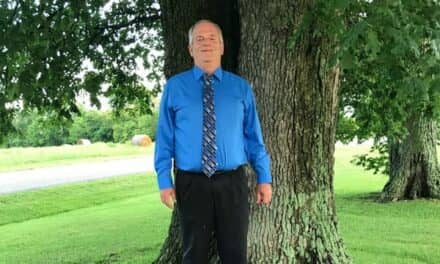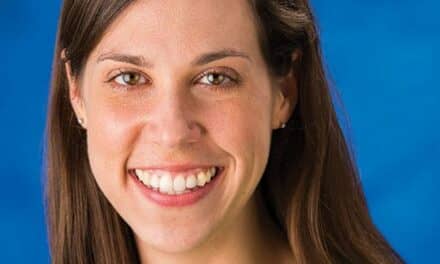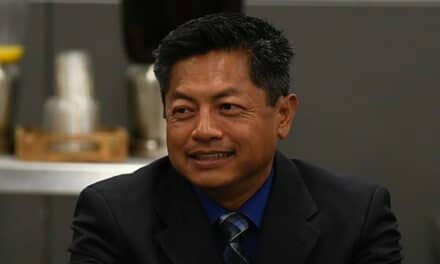A Life-Long Learner
By Andrew Tunnicliffe
David W. Braeutigam, MBA, CHTM, CBET, AAMIF, ITIL, is president of Braeutigam Enterprises LLC, which provides consultancy services across the HTM sector. With more than 40 years in the field, his career is one of longevity, arguably growing with the profession itself. The contribution Braeutigam has made during that time is unquestionable.
He’s the first to admit, though, it wasn’t a childhood dream of his to work in HTM or even biomedicine. In fact, he says he didn’t know the profession existed back then—which, to be fair, it barely did; HTM was fledgling at best in the late ’60s and early ’70s.
As a high school junior in El Paso, Braeutigam took the Armed Services Vocational Aptitude Battery test. “It said I scored high in math, electronics, etc.,” he says, “and the high school counselor pointed me toward the Army and medical equipment repair.” It was a piece of advice that would shape his life thereafter.
Although he signed up immediately, it wasn’t until the summer he left high school that he could join, serving for more than four years as a BMET. It was something he, in his formative years, never saw himself doing. “As a teenager, I worked as a pipe fitter installing overhead sprinkler systems in buildings,” he says. “I had good grades in high school, but I didn’t see myself going to college for a degree. Of course, we didn’t have money for a college degree either. The Army was a great way to transition from high school to adult life.”
During his service, Braeutigam did his basic training in Denver, before moving to Walter Reed Army Medical Center in Washington, D.C., where he worked as a BMET for a year. He later moved back to Denver to take an advanced course—knowledge he then used in his next post maintaining medical equipment for a field unit in Ft. Bragg, N.C.
Although by this point he knew an Army career wasn’t for him, his transition into adulthood was well underway. Once his enlistment was over, and after serving a brief stint at an El Paso hospital, he moved back to Dallas, encouraged by his brother of the promise of greater job prospects. The move home saw him find work at Baylor Medical Center, where he stayed for more than 35 years. “I started as a BMET and ended up as the system director for HTM,” he says.
As a young biomed, Braeutigam says he worked with “some of the great leaders in our field,” including Jeff Butler and Richard Roa. “Those guys were pioneers; they really knew their stuff and I learned a lot working with them.”
No doubt today’s up-and-coming HTM leaders would say the same about him. An undisputed industry leader, Braeutigam boasts many professional accolades, including being named AAMI/GE Healthcare’s “BMET of the Year” in 2006 and a Fellow of AAMI earlier this year.
Made for Change
The length of his career has allowed him to witness, and help shape, a lot of change. However, that change has kept Braeutigam on his toes, and provided him with some of his greatest challenges. “My top challenge and probably everyone else’s biggest challenge is staying on top technology changes,” he says.
That he has done, reeducating himself where ever possible, including night school. Braeutigam recounts one meeting where the discussion led to an area he had little knowledge of: “We were talking about an EKG storage system and how it was going to be designed and how we were going to support it,” he says. “I remember sitting in that meeting, understanding the computer portion but not the networking portion of it. I was actually embarrassed.” As soon as the meeting ended, he signed up for a course on networking to fill that gap.
However, perhaps his biggest learning challenge came when he wanted to move into management. “A typical challenge of BMETs is transitioning to a manager role,” he says, “since the skillset is completely different. That’s why I went back to school to get my business degree.” After all, he points out, technical skills and management skills are completely different.
Braeutigam’s route to management was, in his own words, the result of a “backhanded compliment” from one of his colleagues during a meeting. He says one of his team members labeled him “one of the smartest guys” he knew, just without a degree. That afternoon, Braeutigam enrolled in a bachelor’s degree management program.
It’s that zest for learning and self-development that arguably defines his career more than anything else. Yet, even today, Braeutigam says he wants to know more. And he encourages aspiring HTM professionals to share his passion for knowledge—whatever path they choose.
Getting ‘RICH’
When asked to define the characteristics of a good HTM professional, Braeutigam offers an intriguing response, “RICH”. “Being ‘resourceful,’ ‘inquisitive,’ ‘customer-focused,’ and ‘helpful’ are the traits that make a great BMET or clinical engineer,” Braeutigam says.
Think about it, he says, BMETs must exhibit their resourcefulness daily, finding parts and suppliers, or even making parts themselves on occasion, particularly when they are no longer available. It’s an aspect of the role he took an active part in, designing and developing solutions tailored to the needs of the medical teams he has worked with.
“You’ve got to be inquisitive too,” he continues. “You’re going to run across stuff— because our field is so broad—that you don’t know and so where do you find that information? Hopefully, you’re inquisitive enough to research the information and find it out so the next time you’re an expert on it.”
For as long as the profession has been in existence, customer focus has been intrinsically related to it, he maintains. Understanding what clinicians need and how you can support them is crucial, he says, since there is often a life—or many—that depend on it. “Whether it’s getting the equipment running quickly, getting it installed or showing [healthcare teams] how the equipment is supposed to properly operate, I think that’s a trait of all of us in biomed.”
During his career, however, there has been a marked shift in that customer focus, largely due to technological innovations. Braeutigam says in the early days the profession was built around concerns over electrical safety. Today, that has greatly shifted, with the focus primarily on cybersecurity. “My studies have shown that probably 25% of equipment in the hospital is connected to the Internet or to a network, putting a lot of equipment at risk.”
He says contrary to the common perception that the HTM profession has morphed from customer-facing to IT, protecting people remains the top goal. Except now, it is from a different kind of threat. “Now the biggest knowledge gap is cybersecurity and how we can work with the information technology security team to ensure our medical equipment is safe.”
Although Braeutigam no longer works in a clinical setting, he is still heavily involved with HTM. In addition to consulting entities about healthcare technology, he helps hospitals with contracts, benchmarking, leadership transition and operations. He also commits a lot of time to another of his passions: writing. Braeutigam has authored numerous books about the profession—including Tales of the Biomed, Tales of the Biomed Part Deux, and Incredible Tales of the Biomed—often relaying the funny stories he’s encountered throughout his career. His next book, however, will highlight what he says are “the great things our field does every day.”
He’s also a World War II buff, writing two books about the men who served with the 408th Bomb Squadron in the Pacific. Like HTM, it’s a subject he speaks of with great passion and enthusiasm.
Serving the HTM field is also something Braeutigam is passionate about. In addition to his more than 30-year involvement with his local biomedical association, Braeutigam has worked with AAMI for 20 years, even serving on its BMET board. His work has included providing guidance and helping to develop certification examination for technology managers.
No Slowing Down
But if you thought now, after four decades in the industry, it was time for Braeutigam to slow down, you’d be mistaken: He’s currently setting up a new biomed school in the Dallas-Fort Worth area. Not that work takes up all his time, however. Braeutigam and his wife still manage to root on their favorite sports team, the Dallas Cowboys.
Hobbies aside, his is a long and illustrious career, in a field in which he never really had any grand ambitions. Yet despite his clear success, he remains modest, saying, “I was only doing my job.” And to his fellow HTM professionals, his advice is simple: Never stop learning. Braeutigam believes there is always something you can be better at or learn more about, whether you’re a BMET 1 or a department manager. Because for this Hero of HTM, it’s all about being a lifetime learner.
Andrew Tunnicliffe is a contributing writer for 24×7 Magazine. Questions and comments can be directed to chief editor Keri Forsythe-Stephens at [email protected].





